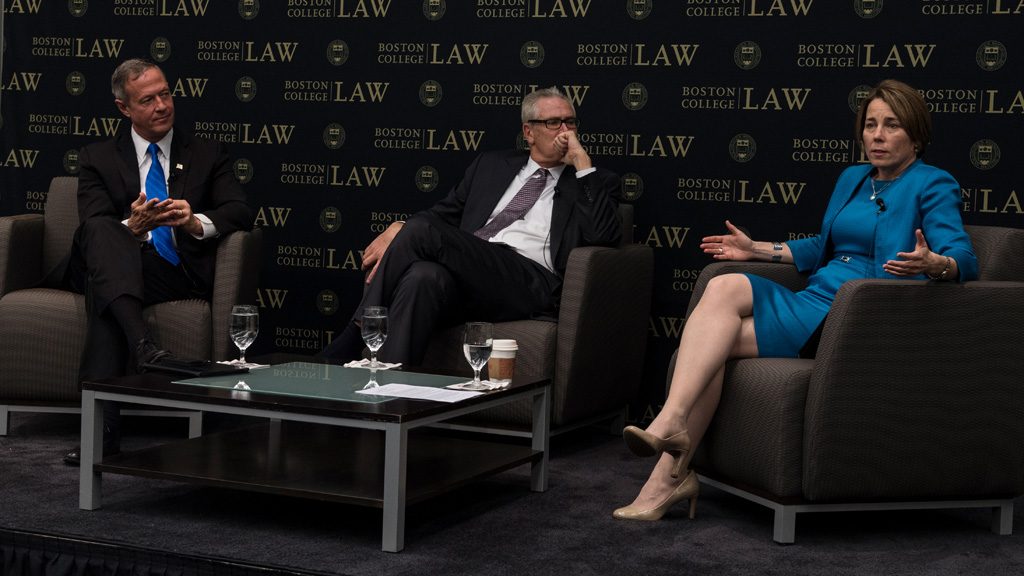You might not expect an event to run smoothly, let alone draw a big crowd, after it was pushed back nearly a month because of a snowstorm and was beset on the day-of by not one, not two, but three power outages.
Despite this, the Rappaport Center for Law and Public Policy’s final event of the year went on as planned, and these setbacks couldn’t faze the panelists, 2016 presidential candidate and former Maryland Governor Martin O’Malley and current Massachusetts Attorney General Maura Healey.
O’Malley, who was marking his last day of his semester-long stay as the Rappaport Center’s Distinguished Visiting Professor, joined Healey on April 25 for a blunt and engaging 90-minute conversation: “Gun Reform: What Can States Do?”, in which both panelists spoke of their personal, political, and legal experiences with gun control at the state and national levels.
Professor R. Michael Cassidy, who is faculty director of the Rappaport Center, moderated the discussion. The audience, including a handful of city officials, crammed into East Wing 120, lining the room to the perimeter, and even overflowing into the hallway. Members of Moms Demand Action for Gun Sense in America were front and center, wearing t-shirts with their logo and sitting alongside the likes of assistant attorneys general.
Following Cassidy’s welcoming remarks, Healey opened, solemnly warning that there has “never been a more important time in our history for lawyers.” Gun control is near and dear to her, she said. She ran her first campaign for office—for state attorney general—on this issue, and it showed. She was able to cite and decipher myriad statistics related to gun violence off the cuff.
Since taking office in 2015, Healey said she has done much to drive down gun-related violence: first sending letters to gun distributors and suppliers to “remind them of the rules of the road,” cracking down on dealers selling or dealing guns illegally, and enforcing existing state laws with regard to guns such as the Glock pistol and the AR-15 assault rifle.
O’Malley dove in next, speaking about his experience passing a litany of stricter measures for fingerprinting and training gun buyers, while also banning certain types of assault rifles and high-capacity magazines. He spoke about the shock of the 2012 school shootings in Newtown, Connecticut, and saying to his staff the morning after: “I’m a little embarrassed that we haven’t taken a run at [gun control] before.”
While the O’Malley administration was getting tougher gun measures on the books in Maryland—both chambers of the Maryland General Assembly were controlled by Democrats, who are more inclined to support stricter gun control—the response at the national level was different, he observed. The Obama administration, for example, was largely unsuccessful in its post-Newtown push for more stringent laws because the issue was a non-starter for many Republicans in Congress.
O’Malley drew one crucial distinction that he believed paved the way for his successful firearms safety act in Maryland, which was upheld earlier this year in the Fourth Circuit Court of Appeals in Richmond. He “set a tone of not vilifying the other side in order to get this done. It was really about the dignity of every human person, and taking action,” he said, rather than succumbing to partisanship and ideology. He didn’t trample on hunters’ rights, he explained, and he worked to get the stories, opinions, and advice of state and municipal police forces.
He shared an anecdote from his push for the bill, in which he sent a letter to every registered hunter in the state, thanked them for preserving Maryland’s “longstanding, rural, hunting traditions,” and assured them that despite what the NRA or its front groups might say, he was not trying to take their guns but rather trying to put forth common sense, public safety gun measures.
Healey seemed to share O’Malley’s frustration with the lack of effective measures nationwide. At times, the lack of stringent enforcement or action from lawmakers both at the national level and in other states makes it difficult for officials in Massachusetts and Maryland to stymie gun officials. Through arbitrage and trafficking, individuals can buy guns in states that have loose gun laws and then transport them across state lines and deal the guns illegally. Healey and O’Malley said that they had seen many illegal firearms that originated from gun-sellers in neighboring or southern states.
Both emphasized that it falls squarely on lawmakers’ and litigators’ shoulders to strive to avoid the “needless, senseless violence and destruction out there”—as O’Malley put it—that accompanies gun violence.
Throughout the event, but especially when as it opened up to the audience, discussion got dicey and emotional. Early, Healey shared that a member in the audience “and a friend” had lost his son to a shooting in Massachusetts.
A law student began the question-and-answer session by saying to Healey the crusade to get AR-15s banned was ill-conceived and nonsensical. He included personal experiences as a gun trainer and statistics to corroborate. Healey voiced her disagreement, was met with pushback from the student and, ultimately, after about six minutes, the two ended at a civil impasse.
Another student presented a similar line of thinking, asking Healey why she wasn’t going after the “criminals” rather than “lawful gun-holders,” and provided data and figures to back up his question. Healey responded that she understood the argument, then offered a measured defense of her belief in upholding the laws she was elected to enforce.
Others questioned in a more sympathetic manner. One man, who prefaced his question by saying that he was a gun owner, said: “It’s great to see our chief law enforcer, Healey, doing this [an assault rifle ban] for us,” and that Boston is the “gun violence prevention capital of America.” He said he had been invited to speak on MSNBC alongside retired US Army General Stanley McChrystal to discuss how AR-15 bullets are designed to pierce soft tissue and inflict maximum damage.
Others asked about the link between mental health and gun violence, the influence of NRA-aligned lobbyists, and to what extent O’Malley influenced the DNC platform on guns.
For an issue as thorny and divisive as gun control, the event was characterized by tact, civility, and respect, which seemed to embrace the panelists’ views that the conversation must include everybody. The issue of gun control is one that requires well-meditated reflection and inclusion, and the audience was treated to exactly that.
Watch Video from the Event





